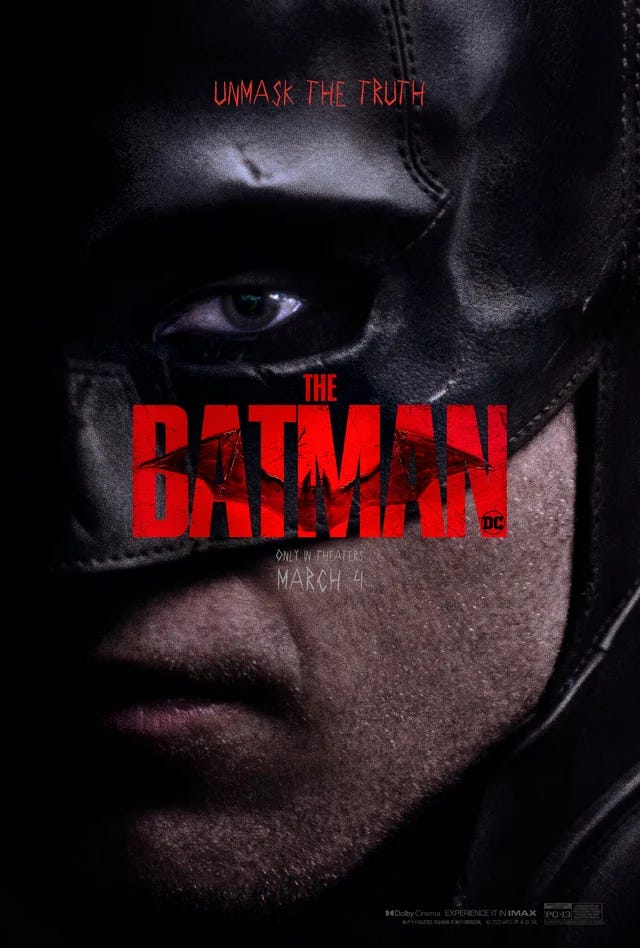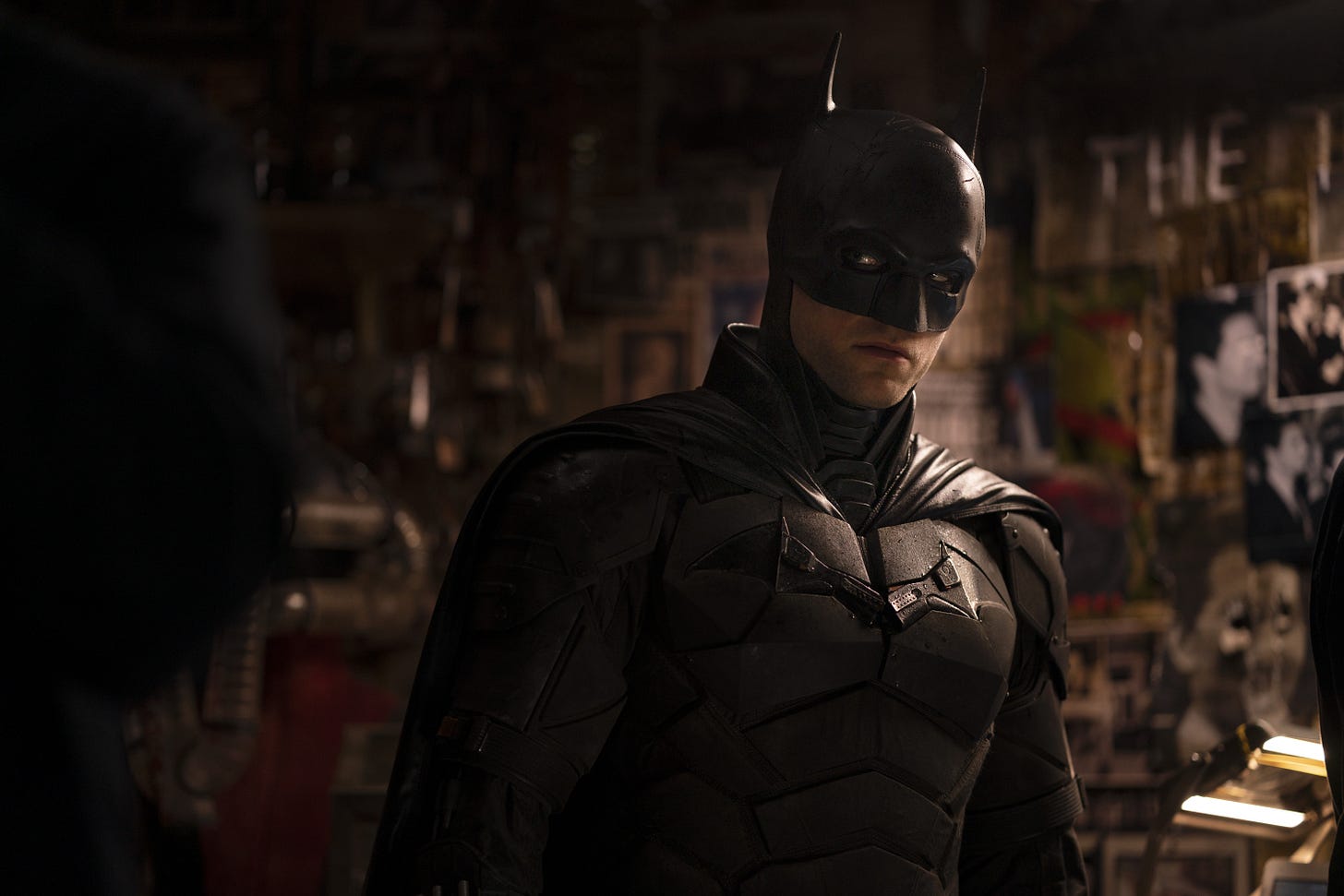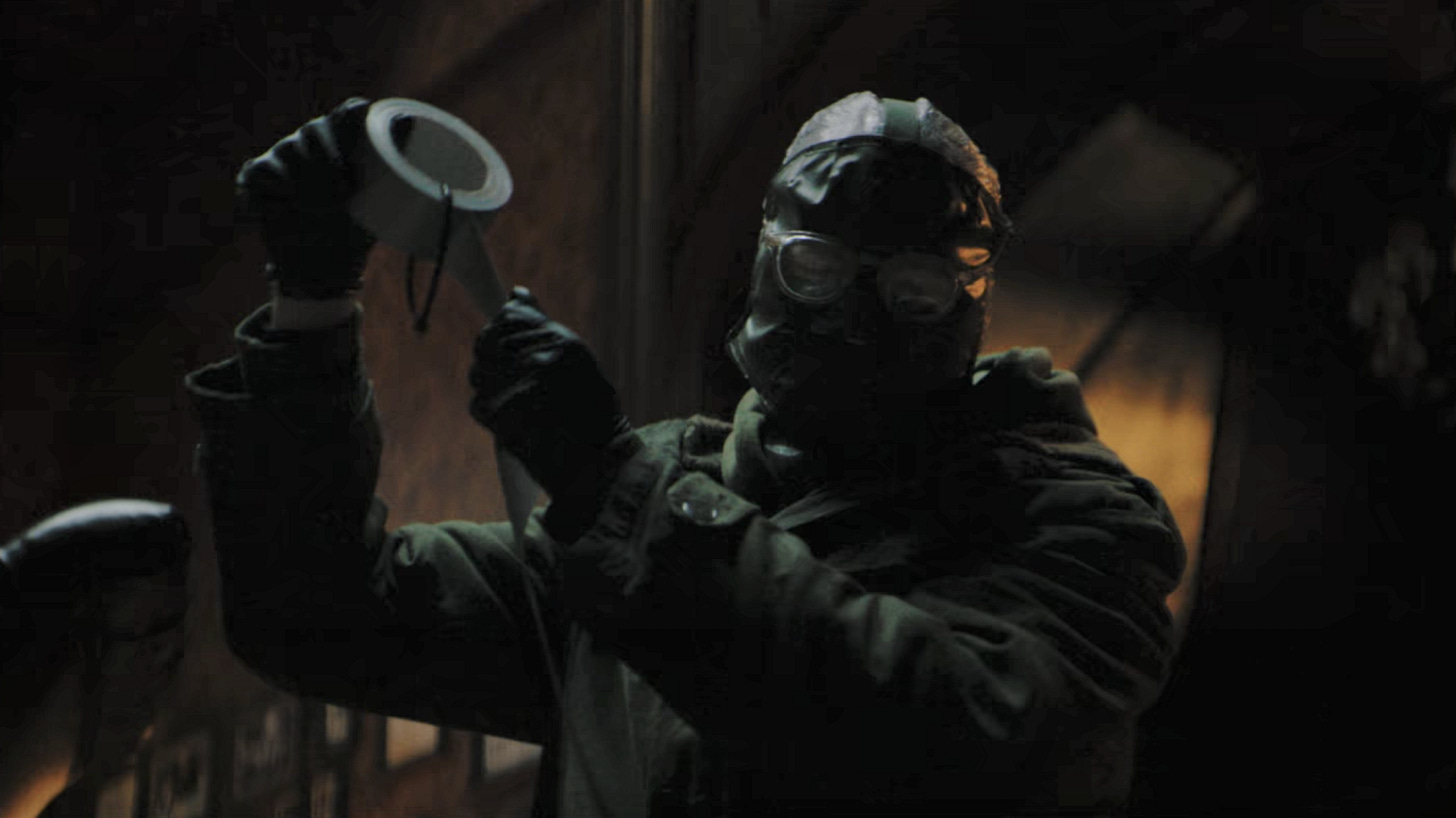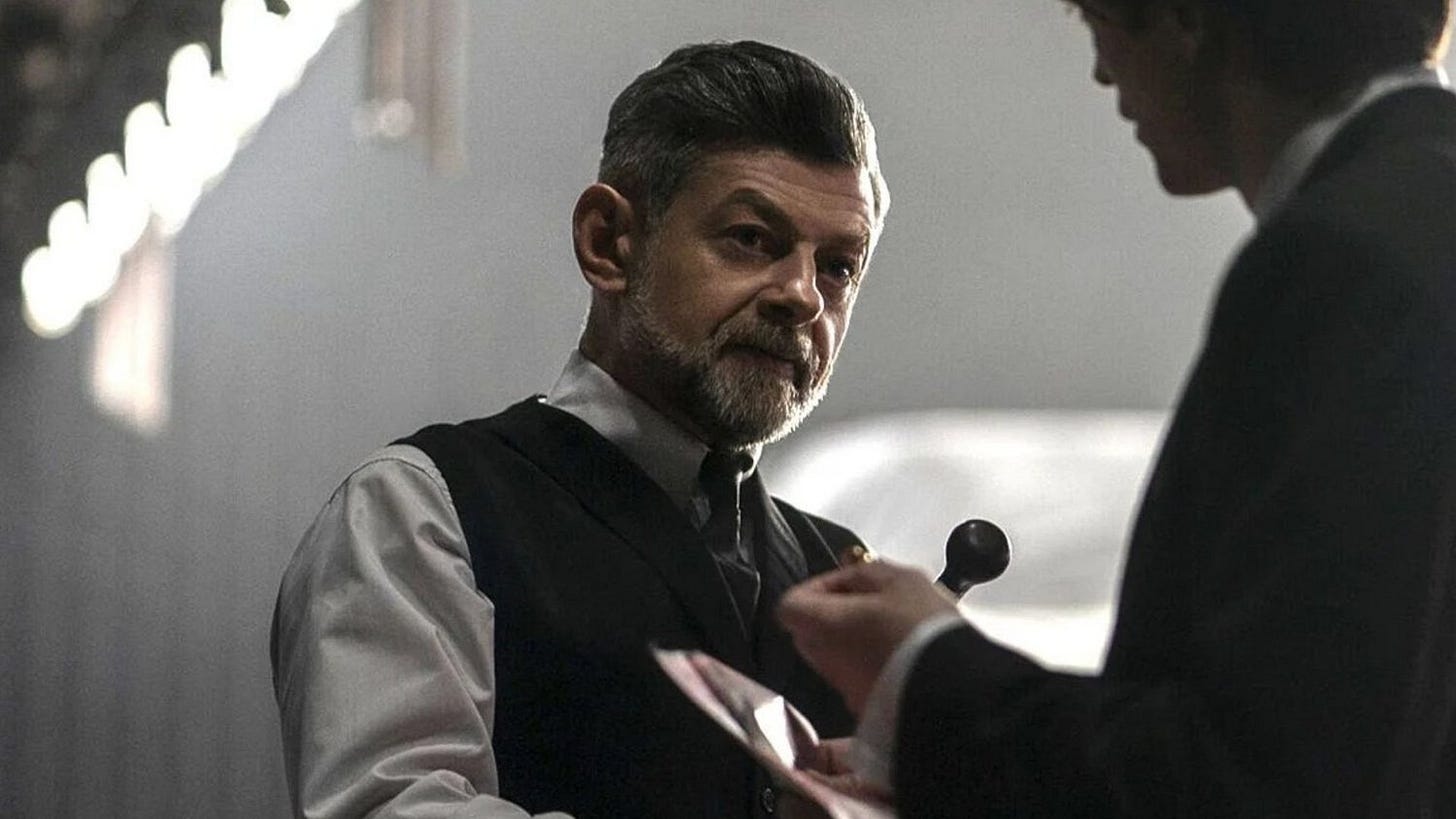REVIEW: The Batman
The Batman can't quite find a balance between it's comic book origins and uber-serious noir aspirations
Vengeance, or the act of inflicting punishment for committing wrongdoing, is what drives Matt Reeves The Batman - a film about punishing those who commit crimes. This is a fundamental foundation of Batman’s ethos throughout the various adaptations of the DC Comics character. The line “I’m vengeance” is spoken by the caped crusader (Robert Pattinson) early on towards a bunch of street thugs, but is then reiterated by several of the supporting roles much to ones confusion; Has he been shlockily saying this to everyone in the last two years of his time as Gotham’s vigilante? Vengeance is a defining theme here, as Pattinson’s Batman is judge, jury and executioner - regardless of a quip about no guns - as it plays a role, not just from Batman’s point of view, but in how the theme of vengeance is incorporated into antagonist character The Riddler (Paul Dano) and his motivations. The central plot revolves around the solving of Riddler’s riddles, each one designed to reveal that Riddler is trying to fight against corruption.
The Batman is at its best when it slows down and let’s itself be the gritty detective noir that Reeves greatly envisions. It finds itself owing a lot of inspiration to David Fincher, a la Se7en and Zodiac, where Dano’s Riddler is as quiet and intimidatingly sinister as John Doe is in Se7en. Batman within the comics and television counterparts is often reffered to as ‘the worlds greatest detective’ so it’s a pleasance to find this eeking back what Christopher Nolan did with the character in his The Dark Knight trilogy. With thundering rain and gadgets galore, this Batman is a brooding, absorbed, traumatised creature of the night.
The ‘new’ technology - long gone are the cheesey Adam West gadgets of sharkspray -for this Batman to play with include an inspired contact lens kit that records his vision so he can rewatch back for clues. It’s a great choice, as one of the key themes Reeves plays with it perception and how we see other people - none more so than the political campaing of the caped crusadar’s own fathers. Unfortunately these are amongst many other gadgets which are sidelined early on as the film pings around the crime story that Riddler is trying to expose. Which becomes the issue at hand with Riddler himself: why is Riddler being so ridiculous? He leaves clues for Batman to follow so he can help, but…why? The plot to this film is then made uneccessarily convoluted as all hell - one of these revolve around deliberately mispronounced Spanish. The first half of Riddler’s story is him attempting to weed out a rat within the crime family/corrupted government. Yet we find out later in the movie he already knows who the rat is, so why force Batman on a journey of discovering all this out for himself.
As many deaths there are in this at the hands of the Riddler, it’s time who is the biggest killer in this. At a weighty two hours and fifty-six minutes long, this stodgy, dense movie becomes overwhelming in how much it wants to do and whom to introduce. The film brings together a gallery of comic characters such as The Penguin (Colin Farrel), Falcone (John Turtorro), Catwoman (Zoe Kravitz), whom all become players in this wild tangled plot. This concotion of rogues then become too much to digest in one film, as we learn who these people are within Gotham’s politics and underground. It means you are always playing catch up, and never able to get on the wavelength of the film.
It doesn’t help that Reeves takes Batman on tangents into his own history, specifically around his parents demise. Reeves plays around with paternal themes - The Sins Of The Father is a riddler clue and is painted in big bold letters on the floor if it wasn’t clear enough - but the tangential direction of putting Bruce on the wrong path weighs down an already bloated and stuffed movie that has to introduce a whole new spin on what matters to this version of Batman. It’s mentioned briefly at one point that Bruce does his vigilantism for his fathers legacy, but it’s said far too late in the game as we have only encountered Bruce to this point with our preconceived notions of the Batman. This is especially noted when one of the first interactions between him and Alfred (a brilliant but woefully underused Andy Serkis) is Bruce saying he doesn’t care about anything Wayne related.
This familial theme is highlighted even more with the introduction of a rapturous Selina Kyle, a sultry cocktail waitress version of Catwoman, inhibited by revenge for her friend and her mother, with an infatuation for stray cats. It makes sense that she would gravitate to a Batman as broody as Pattinson’s version, who himself is the epitome of an orphan stray but it’s a shame that this feels wholly unreciprocated. All the attraction comes from the magnetic Kravitz, while Pattinson’s quizzical infatuation seemingly comes from voyeuristic leering at an undressing Selina. Their chemistry is that of a kitten playing with a half-dead bird. One is entrancingly attached while the other a disinterested party. When the film wants to invoke this attraction as a pivotal development in the story, there’s far too little attachment to their relationship.
There’s more chemistry between Jim Gordon (the always terrific Jeffrey Wright) and Batman, who have seemingly built up a trusting relationship with each other over the two years that Bruce has been the vigilante. Their dynamic is a highlight, with a hushed exchange before an iconic Batman quick departure being the most interesting of their exchanges. They’re also very trusting of one another, even in the face of evidence supporting Batman’s lesser integrity. This becomes frustrating, where a detective as capable as Gordon doesn’t even register the link between receiving evidence about someone from Batman and their disappearance that same night. That unwavering support builds the bond but it pulls down the dramatic momentum of the second act. An APB is put out on Batman, a development that could spell intrigue for the caped crusaders, but this becomes yet another superfluous non-starter of a plot element in a script that is already filled with cheat codes for convenient plot progress.
When a story is this tumescent, it requires a deft hand in other elements to do a lot of the heavy lifting. Which comes from Greig Fraser’s beautifully blazing cinematography - making good use of Volume technology - which illuminates a gloomy Gotham in a saturation of burnt bonfire. This, along with Michael Giacchino’s hauntingly macabre score punctuating the gritty underbelly of the film makes for a fantastic sensory overload that is both thrilling and fundamental in rescuing the indulgent script.
Perhaps the strangest position to find one self in is how to feel about Robert Pattinson’s Batman. The sound and production design does all the heavy lifting here, as Pattinson doesn’t have the gravitas in his voice or mannerisms to really sell it. He can punch his way through countless, faceless thugs and inject himself with a mysterious, random serum that fixes gunshot wounds but his dialogue just doesn’t quite land. The crunch of boots on wet gravel is a wonderful way to focus on how intimidating this version of Batman is, but the sullen undertones of a deliberately emotionally stunted 30-something year old - it is the 20 year anniversary of the Wayne’s murder - leaves much to be desired. A caveat exists; he, alongside Farrel’s Penguin, is involved in a car chase that is so intimately framed that you’re unable to view the outer ramifications of the other vehicles, while a rage-infused Batman beats up a thug after the so-called mystery serum.
Reeves’ The Batman is, for lack of a less perfect descriptor, cool. From the visuals to the soundscape, the exuberant performances from Farrel and Dano help make for a movie that is often wickedly thrilling, but all too frequently monotonous. For a film set deep in the depths of Gotham’s gritty underbelly, the script slowly descends into the chaotic silliness of the characters that it feels so desperate to shed.







